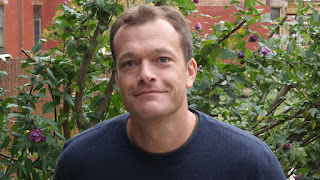48. Chris Bachelder
“At what point, Vince had occasionally wondered, would daily life cease to consist of a series of small threats?” – Chris Bachelder
1.
During a preseason game back in 1966, St. Louis Cardinals linebacker Dave Meggysey caught an earful from assistant coach Chuck Drulis. Having missed a tackle in the game’s first half, Meggysey got quickly rattled and made a few more mistakes. As Meggysey relates in his 1971 memoir, Out of Their League, this caused Drulis to lay into the hapless player during halftime. According to Drulis’ tirade, Meggysey looked like he was “afraid to stick [his] nose in there” and, far worse, that he appeared “almost feminine” when he tried to make a tackle.
A coach attacking a player’s manhood will come as no surprise, especially reading Out of Their League today, but Meggysey is especially sharp on outlining the psychology of the unique relationship between the men on the sidelines and their charges. Because players’ identities are so wrapped up in their ideas of manhood and because they often view the coaches as father figures, this invests the coach with a unique power to bestow and withdraw masculine approval as they please. “Most coaches,” Meggysey explains, “give their players a tantalizing hint of what it might be like to be a man, but keep it just out of reach.”
It all leads to an ongoing cycle of dehumanization, with the men playing through injuries and putting their bodies on the line in order to win the fatherly approval they can never fully achieve. This manipulation allows the system to continue to function, but according to Meggysey, it probably shouldn’t. Written shortly after he quit the NFL, Meggyesy’s book offers a litany of the league’s ills that still reads like a litany of the league’s ills today: its promotion of militarism, the violence and sadism that are both enacted on the field and kindled in the hearts of the fans, the racism inherent in the game’s structure, the entire masculinist culture. (All that’s missing is a full understanding of the lasting damage the game does to the player’s bodies and minds.) These realizations—which fully came to light for Meggysey once he got involved in the anti-war movement—were enough to drive the linebacker out of the league. But before he quit, he left one parting shot, giving an interview to the Philadelphia Inquirer during his last season, in which he laid down the line. “When society changes in the way I hope it will,” he told reporter Sandy Padwe, “football will be obsolete.”
2.
Half a century later, a group of 22 men gathers at a budget hotel by the thruway. They are middle-aged or slightly older and for them football and its attendant rituals are essential. They may not fully believe in them, they may dimly understand their obsolescence, but these rituals are life, they are why they have come.
The Throwback Special, Chris Bachelder’s comic plumbing of midlife masculinity, takes place over roughly a day and half, entirely within and around “a two-and-a-half-star chain off Interstate 95” in an unnamed state. The 22 main characters, who despite Bachelder’s efforts at differentiation, tend to run together, albeit not in a way that damages the book, are there for their annual re-enactment of one of the most violent moments in football history: the play, known as the Throwback Special, where Giants linebacker Lawrence Taylor snapped Redskins quarterback Joe Theismann’s leg into several pieces during a Monday Night Football game, ending the star signal caller’s career. Over the course of a November weekend, the men will stage a lottery to pick which player each re-enactor will portray, intensively study film of the game, and then repair to a nearby middle-school field to stage their ritual, just as they’ve done every year for the past decade and a half.
*****
Bachelder’s book opens on the twin notes of masculine self-consciousness and a general sense of diminishment. Robert, the first man to arrive at the hotel, struggles to attract the attention of the woman at the front desk. His voice is naturally high-pitched and he has to constantly remind himself to lower it lest his tone indicate a feminine submissiveness. Even when he does lower it, “invariably it would rise again to a pitch that assured his auditor that he was nonthreatening.” When he finally does get the woman’s attention, she matter-of-factly rejects his request to check in early and he slinks away.
Wandering around the hotel, he soon finds that things are not as they used to be. The hotel’s chief feature, the fountain, is dry and cordoned off with yellow tape, while the conference room, which the men reserve every year, has this time been booked by a different group, a company with the dispiriting name Prestige Vista Solutions, leaving the men to carry on their activities in their rooms. Decline is everywhere and, over the course of the book, we learn that several of the men are considering making this their final year.
For most of these men, decay and loss of control define much of their sense of middle-aged masculinity. In one scene, Andy and Robert compare the war wounds that come from having aging bodies. “They had both lived in the paradise of a painless body for years without even realizing it,” opines the book’s omniscient narrator, but those days are long past. In another, the narrator provides a litany of the different familial indignities several of the men have come home to in recent years, a catalogue that includes unfaithful wives, children experimenting with sexuality, drugs, moroseness, and animal torture, and helpless, aging live-in parents. (But also, in one case, one of the men’s twin children building twin snowmen.)
The men are there to enact a single, large ritual, but their interactions are built on a series of smaller gestures, some developed over a decade and a half of annual gatherings, others from 40-plus years of living in the world. These include post-lottery smoke breaks by the dumpster, handshakes, and general bluster. Most of these rituals involve some form of deception or self-deception, which the characters agonize about and which Bachelder plays for comic effect. For example, when Chad, Nate, and Andy converge for their annual cigarette ritual, the narrator reveals that all of them have actually quit smoking and outlines each character’s tortured thinking about the reasons why they cannot admit this fact to the other men.
The men’s conversation often takes on a ritualized tone as well, full of bravado and obvious jokes. In one highly comical, if somewhat cruel, moment, the narrator brutally undercuts one of the character’s masculine claims. The lottery drum the re-enactors use, which another of the men had created a number of years ago, is the subject of frequent mockery for the men who object to its unnecessary size and ornamentation and refer to it dismissively as “Fancy Drum.” As soon as Wesley offers his perfunctory bit of commentary—“It would be like, what if I decorated my jigsaw?”—the narrator hops right in to tell us that not only does Wesley not own a jigsaw, but he doesn’t own any power tools and has to suffer the humiliation of going to Home Depot and waiting on a grumpy associate whenever he needs any boards cut.
These mundane gestures, brags, and rituals don’t amount to much when taken by themselves, but added up, they can be exhausting. (And, of course, everything is magnified in the hothouse of six hotel rooms housing 22 men.) This is what Vince is getting at when, after struggling to match the intensity of the one in-shape character’s handshake at the beginning of the book, he considers life to be “a series of small threats.” And that is precisely why the men have come. For one weekend, these threats, the subtle violence undergirding daily masculine encounters, can be swallowed up by the explicit violence of what happens on the football field. By controlling and ritualizing this violence, while subjecting their bodies to very little in the way of actual harm, the men can tap into the ancient power, the “origins of civilization,” that comes from the primal encounter. (Bachelder lays it on perhaps just a bit thick.)
It’s a chance at asserting control for a group of men who either have precious little control or who can only achieve it through desperate assertion (the workout freak ironically known as Fat Michael.) And, in the end, despite Bachelder’s undercutting of the men’s ritual—elaborating on the racial problematic of the scenario, showing the re-enactment through the eyes of four young professionals sitting largely uncomprehending in the bleachers—he allows them a generous measure of nobility in their ceremony. “It was clear to everyone,” the narrator informs us at the end of the book, “that this had been their best Throwback Special.” Whether or not they choose to continue with their annual ritual, this year they can leave completely fulfilled. And they are right to feel that way. After all, it is not given too often to man to achieve perfection.



Comments
Post a Comment